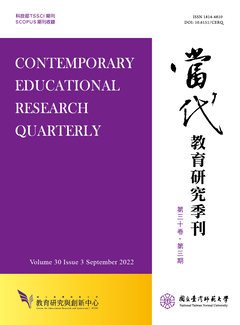

研究目的
本文以 Dewey 經驗哲學為論點,藉由接受學習扶助課程的四位國小三年級學童參與,探討國語教科書(康軒版)三下第一單元〈生活的滋味〉所隱藏的經驗價值,以及經驗連續性的學習歷程。探討學習低成就學生在教材情境中的學習,初級經驗如何引發反思型思維,又如何促發經驗的連續?反思型思維為學習低成就學生帶來如何的學習效果?以及對現今教材情境安排的啟示?
研究設計/方法/取徑
本文以校內公開授課的方式,對四位學習低成就學生進行教學。課堂中蒐集四位學童的表達、對話內容,全程以錄影、錄音的方式收集第一手資料。採用 Dewey 經驗哲學的連續性原則和交互作用原則作為分析觀點,對學童與教師在課堂的對話內容進行編碼與類目,探討教材情境對促發反思型思維的效果。
研究發現或結論
本文發現一個豐富的教材情境可以促發學習低成就學生的反思,以及連續性的學習歷程。而學習低成就學生在反思型思維的連續歷程中,能有較高的學習投入、口語表達的內涵、以及自發互動的討論效果。故對學習低成就學生的教學安排,可加入 Dewey 經驗哲學的觀點,作為教材情境安排的重要參考。
研究原創性/價值
本文以 Dewey 經驗哲學為本,對學習低成就學生進行教學,探討教材情境所隱藏的教育價值,為現行的補救教學方案增加一個不同的教學觀點。而且本文以連續性原則、交互作用原則,分析學習低成就學生上課的討論內容,這是研究 Dewey 經驗哲學的原創。研究結果對 Dewey 哲學理論與教學實務,都存有重要啟示及價值性。
教育政策建議或實務意涵
對學習低成就學生進行教學,應考量一個豐富、多元的教材情境,以促發學生反思型思維的發生。而圖文並茂的圖畫書為教材情境安排的優良工具。另外採取 Dewey 經驗哲學的教材情境教學時,須轉化傳統師生之間教與學的線性關係,以及教師對規劃教材情境須持開放態度。
Purpose
This study focused on Dewey’s philosophy of experiential learning and explored the implicit experiential values within Unit 1, “The Taste of Life,” in a Mandarin Chinese textbook published by KNSH that was designed for third-grade elementary school students. Four third-grade students who participated in an assisted learning program were included in this research. This study investigated the process of experiential continuity for and the learning experiences of low-achieving students with respect to the subject matter situation of the aforementioned textbook unit. We investigated how underachieving children engage in learning within the subject matter situation and how primary experiences can trigger reflective thinking. Additionally, we explored how student experiences can be interconnected and continuous. We assessed the learning outcomes of reflective thinking in low-achieving students and the insights these outcomes can provide in terms of the arrangement of subject matter in instructional contexts.
Design/methodology/approach
This study utilized an open classroom teaching approach within a school setting to instruct four low-achieving students. Firsthand data were collected by recording the students’ expressions and conversations. The study employed Dewey’s principles of continuity and interaction as analytical perspectives, encoding and categorizing the dialogues between the students and the teacher in the classroom. The focus of this study was to assess how effectively the subject matter of the instructional materials would stimulate reflective thinking.
Findings/results
We discovered that a rich subject matter situation can stimulate reflection and improve the continuity of the learning experiences of low-achieving students. Throughout the ongoing process of reflective thinking, the participating low-achieving students demonstrated high levels of engagement, enriched oral expression, and a propensity to engage in spontaneous interactive discussions, which led to improved learning outcomes. These findings indicate that Dewey’s experiential philosophy can serve as a valuable reference in designing the arrangement of instructional materials in different subject matter situations for low-achieving students.
Originality/value
This study employed Dewey’s philosophy of experiential learning and focused on teaching low-achieving students and exploring the educational values unerlying subject matter situation. It introduces a unique instructional perspective that can complement existing remedial teaching approaches. Moreover, this study adopted Dewey’s principles of continuity and interaction to analyze classroom discussions among low-achieving students, which represents a novel form of applying Dewey’s experiential philosophy in research. Our findings offer key insights and have practical value with respect to both Dewey’s philosophical theory and instructional practices.
Implications for policy/practice
Educational policymakers should design teaching materials with rich and diverse subject matter situations to foster reflective thinking among low-achieving students. Picture books with vibrant visuals can serve as excellent tools for shaping subject matter situation. Furthermore, Dewey’s experiential philosophy can be adopted in instructional contexts to transform the linear relationship between teachers and students in teaching and learning.

This work is licensed under a Creative Commons Attribution-NonCommercial 3.0 Taiwan License.
Center for Educational Research and Innovation, National Tawain Normal University
162, Ho-Ping East Rd, Sec. 1, Taipei, Taiwan | Tel:+886-2-7749-3670 | E-mail: cerecerq@gmail.com
CERI | NTNU | E-mail Alerts | Open Journal System
© 2014 CERI-NTNU
